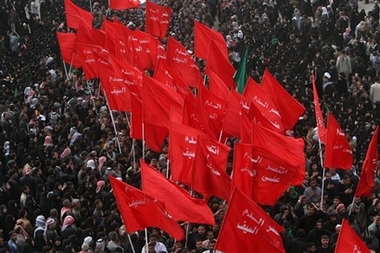Latest Bloodshed
58 killed in Iraq on Shi'ite holy day
(AP)
Updated: 2007-01-31 09:53
 |
Large Medium Small |
BAGHDAD, Iraq - Bombers struck Shi'ite worshippers in two cities Tuesday and gunmen ambushed a busload of pilgrims in a series of attacks that killed at least 58 people as more than 2 million Shi'ites jammed major shrines for ceremonies marking Ashoura, the holiest day of the Shiite calendar.
In the deadliest attack, a suicide bomber blew himself up among a crowd of worshippers entering a Shiite mosque in Mandali near the Iranian border, killing 26 people and wounding 47, according to police. At least 12 more died and 28 were wounded when a bomb exploded in a garbage can as Shiites were performing outdoor rituals in the largely Kurdish city of Khanaqin, police said.
In Baghdad, gunmen in two cars opened fire on a bus carrying pilgrims to the capital's most important Shiite shrine, killing seven and wounding seven, police said. Hours later, mortar shells rained down on two mostly Sunni neighborhoods, killing nine and wounding 30 in what police said appeared to be a reprisal attack.
One person was killed in a mortar attack on a Shiite neighborhood, police said. A Shiite man was shot dead in Baghdad and two policemen were killed in a bombing in Mosul, police said. At an Arab League meeting in Tunisia, Iraqi Interior Minister Jawad al-Bolani asked other Arab countries to set aside room in their hospitals for wounded Iraqi police.
Intense security prevented major violence in the Shiite holy cities of Karbala and Najaf, venues for the biggest and most important Ashoura commemorations. Police found eight bodies Tuesday of people slain by sectarian death squads in Baghdad, the lowest single-day total in months.
Ashoura ceremonies mark the 7th-century death of Imam Hussein, grandson of the Prophet Mohammad, in a battle near Karbala that cemented the Sunni-Shiite schism. Worshippers beat themselves with chains, slice their heads with knives and pound their chests in expressions of grief over the death of Imam Hussein.
More than 1.5 million pilgrims, mostly Iraqis but from as far away as India and Pakistan, jammed the southern city of Karbala for the Ashoura commemorations, according to provincial Gov. Akeel al-Khazaali. Hundreds of thousands more joined rituals in Najaf, Baghdad and other cities.
In Karbala, all private transport was banned - including bicycles - and pilgrims had to submit to body-searches at dozens of checkpoints before reaching the two golden-domed shrines of Imam Hussein and his half brother Imam Abbas. US unmanned surveillance aircraft flew over the city to look for signs of trouble, al-Khazaali said.
"Even if the terrorists tear us to pieces, we will not stop coming to visit Imam Hussein," said Abbas Karim, 27, a laborer from Nasiriyah.
Security has been tight at Ashoura commemorations since a string of bombings and suicide attacks killed at least 181 people at Shiite shrines in Baghdad and Karbala in 2004. Last year's Ashoura commemorations were largely peaceful, but suicide bombers killed 55 Shiites in 2005.
This year, fears of sectarian attacks were running high because of ongoing Sunni-Shiite violence, which surged after last February's bombing of a major Shiite shrine in the mostly Sunni city of Samarra.
Security measures were further tightened after US-backed Iraqi forces fought a fierce, all-day battle last weekend with hundreds of messianic Shiites who officials said were planning to slaughter pilgrims and clerics during Ashoura commemorations in Najaf.
In Najaf, deputy Gov. Abdul-Hussein Abtan said that more than 300 militants were killed and 650 captured in the battle, which ended Monday. He said 11 Iraqi troops were killed and 30 wounded. Two US soldiers died when their helicopter crashed during the fighting.
Both of Tuesday's bombings took place in Diyala province, where Sunni-Shiite violence is raging.
In Khanaqin, Abed Jassim Hassan said he was participating in the rituals with his 11-year-old son when "all of a sudden the bloodshed struck." Hassan spoke as he held the boy, whose right leg was broken and bleeding.
| 分享按钮 |

